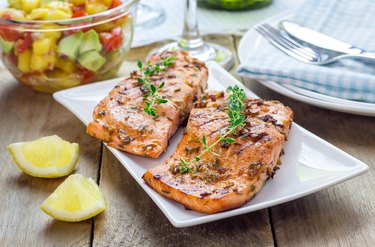
Inflammation is a built-in defense mechanism in the body. For instance, the process helps heal a cut — that's why you see some redness, swelling, and sometimes even heat around a cut. That's the kind of inflammation that's good, healthy and typical.
There's another kind — called chronic inflammation — that's not healthy, and over time can harm your overall health and put you at a higher risk of developing chronic conditions, such as heart disease, cancer, autoimmune illnesses and even Alzheimer's.
Video of the Day
Video of the Day
Related Reading
Omega-3s for Inflammation
What you eat has the potential to make a difference. In fact, there's one particular nutrient that dietitians and anti-inflammatory experts consistently recommend as important and highly helpful.
"Omega-3s are one nutrient that has perhaps the most tangible research specific to inflammation," Carolyn Williams, PhD, author of Meals that Heal, tells LIVESTRONG.com
Omega-3s are the good-for-you fats found in oily, cold-water fish, some shellfish and some seeds, nuts and their oils. They pull double-duty in that they play a role in creating anti-inflammatory compounds and also help discourage the production of inflammatory markers.
"Consuming omega-3s, specifically DHA and EPA, helps change the fatty acid composition of cell membranes," Lainey Younkin, RD, a dietitian at Lainey Younkin Nutrition, says. "This influences how cells communicate with each other and the compounds that are produced in the inflammatory response."
DHA and EPA seem to specifically make compounds that are potentially anti-inflammatory including certain eicosanoids and resolvins, per a March 2010 review in the journal Nutrients.
Adults with overweight who took omega-3 supplements for 4 months lowered their inflammatory markers, but those who didn't take any omega-3s saw a rise in their inflammatory markers, per an August 2012 study in Brain, Behavior, and Immunity.
Specifically, omega-3s have the potential to lower the production of several types of pro-inflammatory compounds, including C-reactive protein, eicosanoids and cytokines.
"Omega-3s also decrease the production of eicosanoids from arachidonic acid, which can cause inflammation," Frances Largeman-Roth, RDN, nutrition expert and author of Smoothies & Juices: Prevention Healing Kitchen, says.
Related Reading
How to Get More Omega-3s
Now that you're familiar with how omega-3s can conquer inflammation, here are three foods that can help you include more of them in your diet.
1. Seafood
"Fatty fish like salmon, albacore tuna, mackerel, herring and sardines are high in the omega-3 fatty acids DHA and EPA," Younkin says. So are shellfish like oysters and mussels.
The American Heart Association (AHA) recommends eating two servings of fatty fish per week.
"A serving size is 3.5 ounces cooked, which is about the size of a deck of cards," Younkin says, suggesting that you might make it routine to have salmon, or another fatty fish, for dinner once per week. Then, "make tuna salad for lunch and have it on a sandwich or on top of a salad. Or buy frozen salmon burgers, which are easy to heat and serve," she says.
2. Plants
Certain plants have omega-3s, too. "ALA (alpha-linolenic acid) — the type of omega-3 that comes from plant sources, like walnuts, chia and hemp seeds, is a wonderful thing to add to your diet, and these foods also contain other healthy nutrients, like fiber," Largeman-Roth says.
The conversion of ALA to DHA is very low, so it's still smart to seek out DHA omega-3. "If you don't eat seafood, there's algal oil, which is made from marine algae and contains both DHA and EPA. You can find algal oil in seafood alternatives like Good Catch Fish-Free Tuna," Largeman-Roth says.
3. Supplements
"If you don't eat seafood, look for a supplement that delivers between 1,000 and 4,000 milligrams of omega-3s," Williams says.
Still, you want those omega-3s to be predominately in the form of DHA and EPA. "Look for one with a 60/40 ratio of EPA to DHA. For example, a 2,000 milligrams supplement should have about 1,125 milligrams EPA and 875 milligrams DHA."
Related Reading
- Oxid Med Cell Longev: "Dietary Phytochemicals: Natural Swords Combating Inflammation and Oxidation-Mediated Degenerative Diseases"
- Brain Behavior Immunity: "Omega-3 supplementation lowers inflammation in healthy middle-aged and older adults: A randomized controlled trial"
- J Nutr. Biochem: "Dietary fish oil decreases C-reactive protein, interleukin-6, and triacylglycerol to HDL-cholesterol ratio in postmenopausal women on HRT"
- Nutrients: "Omega-3 Fatty Acids and Inflammatory Processes"
- American Heart Association: "Eating fish twice a week reduces heart stroke risk"
Was this article helpful?
150 Characters Max
0/150
Thank you for sharing!
Thank you for your feedback!